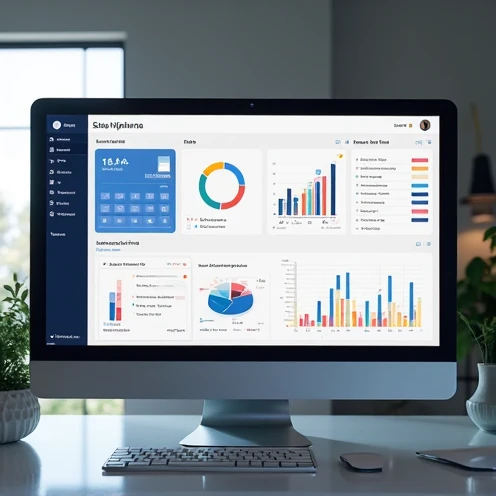Why CRM For Manufacturing Industry Is Now A Business Imperative
CRM (Customer Relationship Management) isn’t just for retail or tech companies anymore. In today’s highly competitive and fast-paced environment, manufacturers must also build stronger, smarter relationships—not only with their customers but across their entire value chain. The CRM for manufacturing industry has evolved into a tailored solution that supports everything from production management to B2B sales and after-sales service. This transformation allows factories to increase efficiency, optimize communication, and streamline supply chains—making CRM an essential piece of industrial success.
Understanding the Role of CRM in Manufacturing
Iklan Google AdSense
Manufacturing businesses deal with unique challenges—bulk orders, long sales cycles, customized production, and high-volume customer support. That’s where a specialized CRM system comes into play.
It enables manufacturers to centralize data, automate processes, and improve coordination between departments. From order intake to delivery scheduling and warranty management, a manufacturing CRM simplifies complex workflows and enhances visibility across the company.
Iklan Google AdSense
How CRM Connects the Production Line to the Sales Pipeline
Sales and production often operate in isolation, creating friction and inefficiencies. However, a robust CRM solution aligns these two critical areas by offering real-time insights into order statuses, available inventory, and delivery timelines.
With both teams working from a unified dashboard, sales reps can set accurate customer expectations, and production planners can better prioritize work orders based on revenue-generating opportunities.
Key Features That Define a Manufacturing-Focused CRM
A CRM built for industrial use includes more than just contact databases and deal tracking. Look for advanced capabilities such as:
- Automated quote-to-cash processes
- Serial number tracking and service histories
- Supplier and distributor portals
- Inventory visibility and forecasting
- Custom reporting for manufacturing KPIs
These features help streamline operations while giving leadership a comprehensive view of business performance.
The Impact of CRM on B2B Industrial Sales
B2B sales in manufacturing are complex. Clients often require custom solutions, long-term contracts, and recurring services. CRM tools simplify the tracking of these processes while ensuring that all customer touchpoints are recorded and acted upon.
Moreover, CRM systems help your sales team focus on high-value prospects using lead scoring, opportunity forecasting, and account-based marketing tools—all crucial in high-stakes industrial deals.
Delivering Exceptional Customer Experience Through CRM
Even in manufacturing, where transactions are often large and infrequent, customer experience matters. Buyers expect fast responses, personalized service, and detailed information.
A manufacturing CRM gives your team access to complete customer histories, past order data, and current support cases—so they can respond quickly, solve problems efficiently, and strengthen long-term loyalty.
Strengthening Supply Chain Communication with CRM
Communication breakdowns between vendors, suppliers, and logistics providers can delay deliveries and disrupt production. CRM solves this by uniting external partners into one cohesive system.
With shared updates, automatic notifications, and vendor performance tracking, companies can respond to disruptions in real time—keeping production on schedule and customers satisfied.
Using CRM Analytics to Drive Manufacturing Decisions
Data is the new oil—especially in manufacturing. A modern CRM provides analytics that reveal bottlenecks, predict demand, and measure customer satisfaction.
These insights are vital for process improvements. For example, if a specific client is repeatedly delaying payments, CRM data can flag the issue early, allowing you to renegotiate terms or adjust order schedules accordingly.
CRM Integration With ERP, MES, and Legacy Systems
Standalone tools no longer cut it. CRM platforms now integrate seamlessly with enterprise resource planning (ERP), manufacturing execution systems (MES), and even IoT platforms.
This level of integration creates a connected ecosystem where data flows between departments, dashboards stay updated in real-time, and duplication of effort is eliminated. As a result, your business becomes more agile, scalable, and responsive.
Common Challenges in CRM Implementation (And How To Overcome Them)
CRM success in manufacturing depends on clear planning. Common pitfalls include lack of user adoption, misaligned features, or improper integration.
To avoid these, choose a vendor with manufacturing experience, involve cross-functional teams in planning, and offer role-based training. Make sure your CRM matches real-world workflows, not just theoretical models.
Future-Proofing Your Factory with Smart CRM Technologies
The CRM for manufacturing industry is only getting smarter. With the rise of AI, machine learning, and predictive analytics, the system will soon anticipate customer needs, optimize inventory levels, and automatically adjust production schedules.
Forward-thinking manufacturers who adopt CRM early are already gaining a competitive edge through automation, real-time insights, and better cross-team collaboration.
It’s Time to Level Up With CRM
CRM is no longer optional for manufacturers. It’s a strategic tool that connects your teams, elevates your customer relationships, and boosts operational efficiency.
If you’re in the manufacturing space and still relying on spreadsheets or outdated ERP modules for customer tracking—now is the perfect time to upgrade. CRM for manufacturing industry is the key to unlocking your business’s next stage of growth.
Iklan Bersponsor Google






